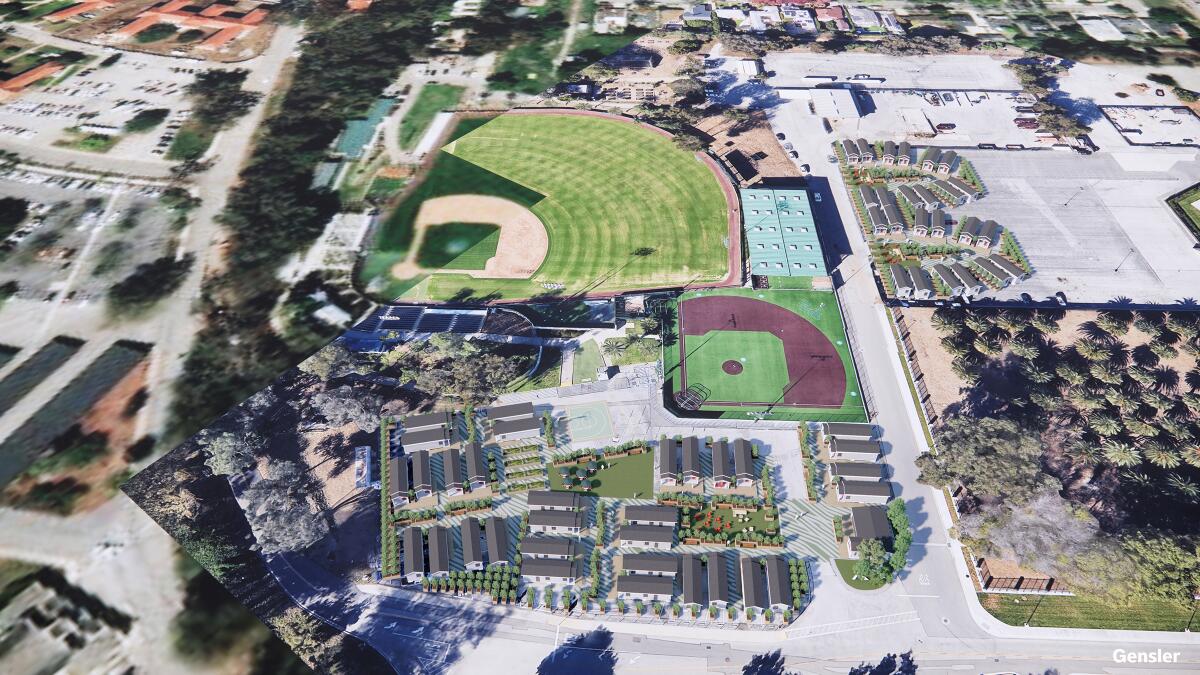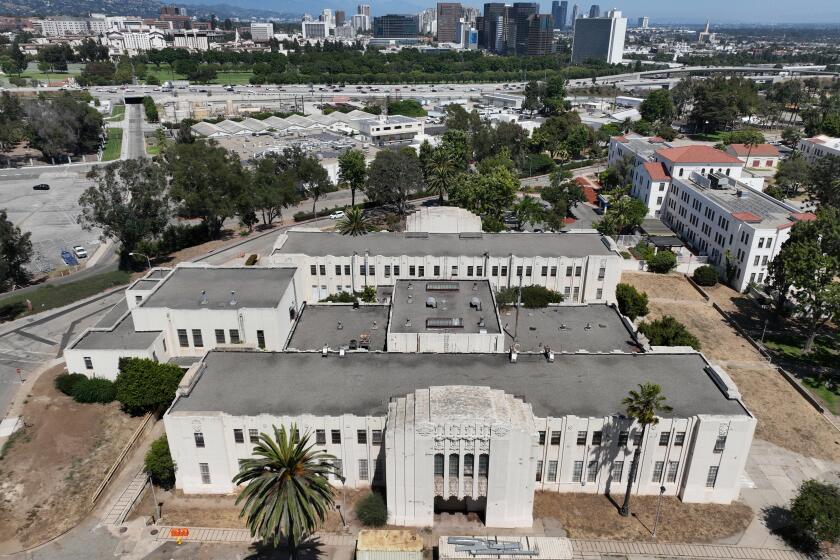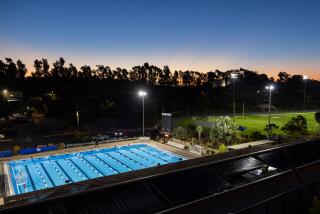VA appeals judgment ordering thousands of housing units built on its West Los Angeles campus

- Share via
The U.S. Department of Veterans Affairs filed an appeal Friday seeking to overturn a federal judge’s ruling that ordered the agency to build more than 2,500 units of temporary and permanent housing on its West Los Angeles campus and invalidated leases of VA land to UCLA and a private school.
Attorney Brad Rosenberg, representing the U.S. Department of Justice, said the government would file an emergency motion Wednesday asking the judge to stay his order pending a decision by the 9th Circuit Court of Appeals.
In the same hearing Friday, U.S. District Judge David O. Carter indicated he may soon temporarily allow UCLA’s baseball team to resume use of its Jackie Robinson Stadium, which he had closed, while a permanent settlement with UCLA is negotiated.
But the appeal threw confusion into Carter’s initial plan to get 106 modular units installed on the campus in the next 90 days.
Carter’s orders stem from a class action lawsuit filed on behalf of veterans that alleged the VA had failed in its duty to provide housing on the campus for disabled and homeless veterans and had illegally leased portions of the 388-acre campus to UCLA, the Brentwood school and several other outside interests.
Officials representing the VA, who had committed in previous hearings to pay for the housing and cooperate with plaintiffs in the case to expedite its installation, told Carter on Friday they were still committed and could have a contract in place in three weeks. But Rosenberg said the government takes the position that any payment to procure the housing would “irreparably harm” the VA by diverting the money from other services.
Randy Johnson, a housing expert witness for the plaintiffs, told the judge that the vendor selected for the job required an “ironclad guarantee” of payment before it would begin manufacturing the units.
Carter pressed the VA to untangle the apparent contradiction.
“It’s as simple as this,“ he asked Rosenberg. “Are we moving forward on these modules or not?”
“We do need to allow enough time for the 9th Circuit to make a decision before there is irreparable harm,” Rosenberg replied.
“Until I get a stay from the 9th Circuit, this court goes forward,” Carter said. “This is an emergency.”
The VA issued a statement Friday saying it appealed because the “court exceeded its legal authority, and its orders would prevent VA from fulfilling our mission to end veteran homelessness by diverting critical resources from efforts that are proven to get veterans off the streets and save lives– including VA health care, permanent housing support, legal assistance, job training, and much more.”
It said the VA has “permanently housed more homeless veterans in Los Angeles than anywhere else in America for each of the past three years (including 1,854 veterans during 2024), and we will not rest until every veteran has a safe, stable place to call home.”
A ‘Town Center’ is a must for thousands of veterans who will one day live on the VA’s 388-acre West Los Angeles campus. But there is scant agreement on what that entails: hundreds of housing units, or retail and social center for vets living far and wide.
In a sequence of rulings, Carter had found that the VA had a fiduciary duty to use the land for veterans housing and that the leases were invalid because they did not primarily serve veterans.
After a four-week non-jury trial, he ordered the VA in September to build 1,800 units of permanent housing and 750 units of temporary housing and convened a continuous hearing over the following weeks to determine what to do with the leased property, which includes UCLA’s Jackie Robinson Stadium and a 22-acre sports complex built by the Brentwood School.
In his opening move to implement his ruling, Carter ordered the VA to install 106 modular units on three locations on the campus including the parking lot for UCLA’s baseball stadium.
The appeal disrupted not only that plan but also cast doubt on a proposed settlement between the veterans and the Brentwood School. Under that arrangement, the veterans would be able to dictate hours the school could use the facilities, which include a football stadium, basketball pavilion, Olympic pool and weight room. The school would have a one-year lease, allowing the veterans to use any of the land for housing if needed.
Carter said he hoped the facilities would never be touched.
“I believed this was a real benefit to veterans and a real benefit to Brentwood,” he said.
But the VA, the defendant in the case, had not signed off on that agreement. Rosenbeg said Friday it objected on several grounds including Carter’s insistence that the invalidated 10-year lease be replaced by a one-year lease.
The Brentwood School’s attorney, Jonathan Sandler, said the school stood by its agreement, which it views as benefiting students and veterans.
“I’m not clear what the VA is seeking,” a frustrated Carter said.
“I’m not clear either,” Sandler said.
Carter turned to the future of the UCLA baseball stadium.
He said if there was no immediate need to raze the facility to use the land for housing, he saw some benefit in UCLA’s offer to increase its annual rent from $300,000 to $600,000.
Attorney Raymond Cardozo, who appeared by Zoom, proposed a temporary solution to restore use of the stadium while he negotiates a “holistic” solution with the court-appointed Monitor John Hueston.
Carter said he was prepared to put that plan into an injunction Friday but postponed the ruling until Monday to give the veterans attorneys time to confer with their clients.
More to Read
Sign up for Essential California
The most important California stories and recommendations in your inbox every morning.
You may occasionally receive promotional content from the Los Angeles Times.












